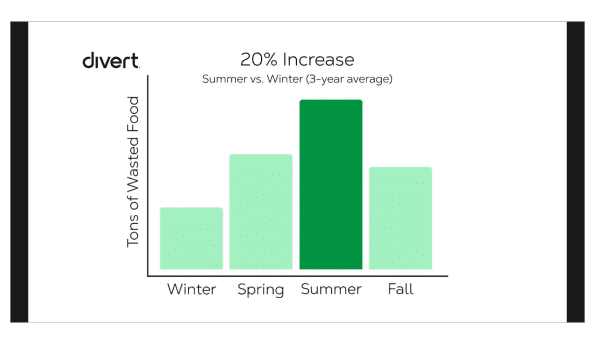Graph showing the 20% increase in wasted food during the summer months.
(Courtesy of Business Wire)
Abundance during peak growing season, drastic heat changes, and changing consumer behaviors contribute to the dramatic summertime spike
West Concord, Massachusetts, June 21, 2023, The Summer Solstice – Divert, Inc., an impact technology company on a mission to Protect the Value of Food, today announced new data showing that wasted food from grocery stores increases by an average of nearly 20% during the summer months compared to the winter months.
“Summer marks peak growing season across the U.S. While this is a time to celebrate an abundance of fresh produce and gather with our family and friends, our data indicates that the summer is also a period when a significant amount of that produce goes to waste,” said Ryan Begin, CEO and Co-founder, Divert. “Divert is committed to reducing wasted food by bringing together the industry, driving awareness and deploying solutions to prevent unnecessary waste – whether it’s in consumers’ kitchens or on the grocery store shelf.”
Divert looked at wasted food processed at its facilities across the U.S. from 2020-2022 during the months of July, August, and September compared to January, February, March. In its analysis of what is contributing to the drastic increase, the company has identified a number of key factors – and what both consumers and retailers can do to address them:
- Peak Produce Season
An increased abundance of produce during the summer months translates to a greater volume coming into grocery stores. In addition to a greater selection, more fresh food can go to waste if it is not moved and sold quickly enough.
Technologies like artificial intelligence (AI) and Internet of Things (IoT) solutions can be utilized to identify trends or issues in stores, and uncover insights that can inform food retailers’ future processes to prevent unnecessary waste.
- Heat and Human Error
When produce is exposed to greater temperature fluctuations like those seen during the summer months, the percentage of wasted food increases for retailers. In the heat of the summer, produce left on a retailer’s loading dock for too long before being moved into a cooler can cause it to lose freshness more quickly. When that food goes home with the consumer, it then lasts for fewer days in their fridge.
Increased awareness and appropriate training of retail employees led by data-driven insights could help to address this.
- Consumer Demands for Perfection
With bountiful produce and fresh foods during the warmer months, consumers are shopping for more fruits and vegetables than they need, which then go to waste. There is also sustained demand from consumers for the best looking, unblemished produce – the still edible apple with a slight imperfection is often overlooked and discarded.
The solution here starts with both retailers and consumers changing their perceptions to see the value in all food. Stores can improve their food donations program or seamlessly mark down soon-to-expire products, encouraging conscious consumption. Consumers can rethink their approach to purchasing food and recognize that appearance does not always correlate to nutrition, quality and taste
While summer shows a significant, consistent increase in the amount of wasted food, this is a year round crisis; 63 million pounds of food is thrown away annually in the U.S. alone and wasted food contributes up to 10% of greenhouse gas emissions globally. Divert has made significant progress in addressing this crisis through its advanced technologies, logistics, and sustainable infrastructure, processing more than 2.3 billion pounds of wasted food working with nearly 5,400 retail stores across the U.S.
For more information on how consumers can reduce their wasted food impact, please read our latest blog “Five Things You Can Do To Reduce Wasted Food” or visit www.divertinc.com.
About Divert, Inc.
Divert, Inc. is an impact technology company on a mission to Protect the Value of Food. Founded in 2007, the company creates advanced technologies and sustainable infrastructure to eliminate wasted food, driving social and environmental impact. Divert provides an end-to-end solution that prevents waste by maximizing the freshness of food, recovers edible food to serve communities in need, and converts wasted food into renewable energy. The company works with five Fortune 100 companies and nearly 5,400 retail stores across the U.S., helping food retailers to reach their sustainability goals. For more information on Divert, Inc., please visit www.divertinc.com.
Abundance during peak growing season, drastic heat changes, and changing consumer behaviors contribute to the dramatic summertime spike
West Concord, Massachusetts, June 21, 2023, The Summer Solstice – Divert, Inc., an impact technology company on a mission to Protect the Value of Food, today announced new data showing that wasted food from grocery stores increases by an average of nearly 20% during the summer months compared to the winter months.
“Summer marks peak growing season across the U.S. While this is a time to celebrate an abundance of fresh produce and gather with our family and friends, our data indicates that the summer is also a period when a significant amount of that produce goes to waste,” said Ryan Begin, CEO and Co-founder, Divert. “Divert is committed to reducing wasted food by bringing together the industry, driving awareness and deploying solutions to prevent unnecessary waste – whether it’s in consumers’ kitchens or on the grocery store shelf.”
Divert looked at wasted food processed at its facilities across the U.S. from 2020-2022 during the months of July, August, and September compared to January, February, March. In its analysis of what is contributing to the drastic increase, the company has identified a number of key factors – and what both consumers and retailers can do to address them:
- Peak Produce Season
An increased abundance of produce during the summer months translates to a greater volume coming into grocery stores. In addition to a greater selection, more fresh food can go to waste if it is not moved and sold quickly enough.
Technologies like artificial intelligence (AI) and Internet of Things (IoT) solutions can be utilized to identify trends or issues in stores, and uncover insights that can inform food retailers’ future processes to prevent unnecessary waste.
- Heat and Human Error
When produce is exposed to greater temperature fluctuations like those seen during the summer months, the percentage of wasted food increases for retailers. In the heat of the summer, produce left on a retailer’s loading dock for too long before being moved into a cooler can cause it to lose freshness more quickly. When that food goes home with the consumer, it then lasts for fewer days in their fridge.
Increased awareness and appropriate training of retail employees led by data-driven insights could help to address this.
- Consumer Demands for Perfection
With bountiful produce and fresh foods during the warmer months, consumers are shopping for more fruits and vegetables than they need, which then go to waste. There is also sustained demand from consumers for the best looking, unblemished produce – the still edible apple with a slight imperfection is often overlooked and discarded.
The solution here starts with both retailers and consumers changing their perceptions to see the value in all food. Stores can improve their food donations program or seamlessly mark down soon-to-expire products, encouraging conscious consumption. Consumers can rethink their approach to purchasing food and recognize that appearance does not always correlate to nutrition, quality and taste
While summer shows a significant, consistent increase in the amount of wasted food, this is a year round crisis; 63 million pounds of food is thrown away annually in the U.S. alone and wasted food contributes up to 10% of greenhouse gas emissions globally. Divert has made significant progress in addressing this crisis through its advanced technologies, logistics, and sustainable infrastructure, processing more than 2.3 billion pounds of wasted food working with nearly 5,400 retail stores across the U.S.
For more information on how consumers can reduce their wasted food impact, please read our latest blog “Five Things You Can Do To Reduce Wasted Food” or visit www.divertinc.com.
About Divert, Inc.
Divert, Inc. is an impact technology company on a mission to Protect the Value of Food. Founded in 2007, the company creates advanced technologies and sustainable infrastructure to eliminate wasted food, driving social and environmental impact. Divert provides an end-to-end solution that prevents waste by maximizing the freshness of food, recovers edible food to serve communities in need, and converts wasted food into renewable energy. The company works with five Fortune 100 companies and nearly 5,400 retail stores across the U.S., helping food retailers to reach their sustainability goals. For more information on Divert, Inc., please visit www.divertinc.com.




